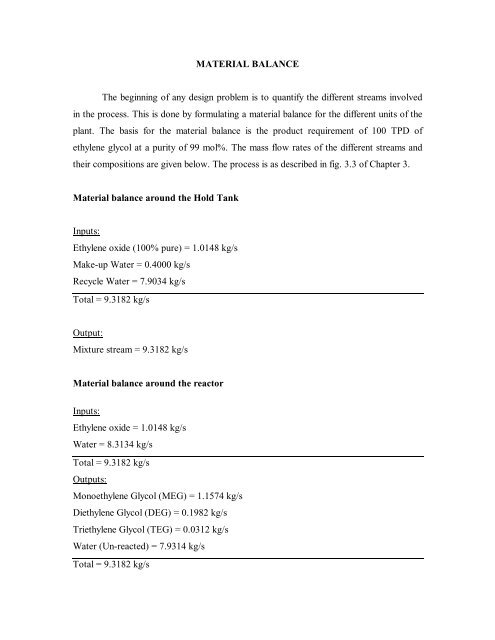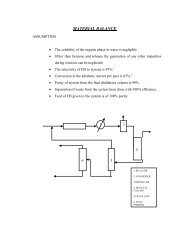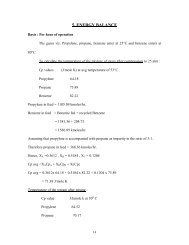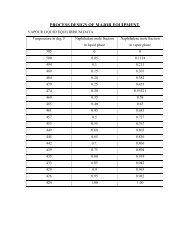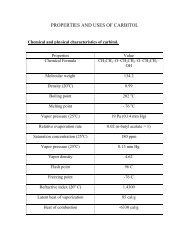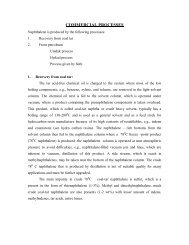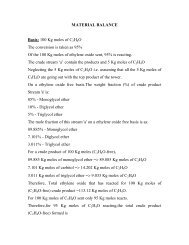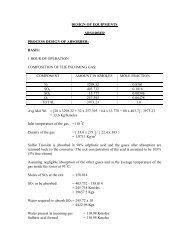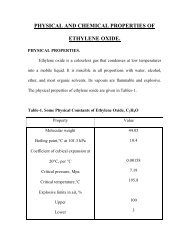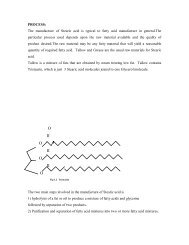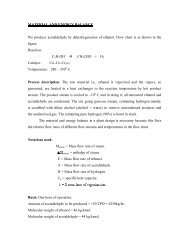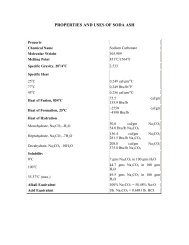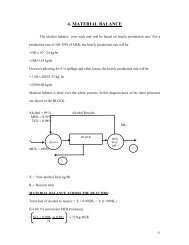MATERIAL BALANCE The beginning of any design problem is to ...
MATERIAL BALANCE The beginning of any design problem is to ...
MATERIAL BALANCE The beginning of any design problem is to ...
You also want an ePaper? Increase the reach of your titles
YUMPU automatically turns print PDFs into web optimized ePapers that Google loves.
<strong>MATERIAL</strong> <strong>BALANCE</strong><br />
<strong>The</strong> <strong>beginning</strong> <strong>of</strong> <strong>any</strong> <strong>design</strong> <strong>problem</strong> <strong>is</strong> <strong>to</strong> quantify the different streams involved<br />
in the process. Th<strong>is</strong> <strong>is</strong> done by formulating a material balance for the different units <strong>of</strong> the<br />
plant. <strong>The</strong> bas<strong>is</strong> for the material balance <strong>is</strong> the product requirement <strong>of</strong> 100 TPD <strong>of</strong><br />
ethylene glycol at a purity <strong>of</strong> 99 mol%. <strong>The</strong> mass flow rates <strong>of</strong> the different streams and<br />
their compositions are given below. <strong>The</strong> process <strong>is</strong> as described in fig. 3.3 <strong>of</strong> Chapter 3.<br />
Material balance around the Hold Tank<br />
Inputs:<br />
Ethylene oxide (100% pure) = 1.0148 kg/s<br />
Make-up Water = 0.4000 kg/s<br />
Recycle Water = 7.9034 kg/s<br />
Total = 9.3182 kg/s<br />
Output:<br />
Mixture stream = 9.3182 kg/s<br />
Material balance around the reac<strong>to</strong>r<br />
Inputs:<br />
Ethylene oxide = 1.0148 kg/s<br />
Water = 8.3134 kg/s<br />
Total = 9.3182 kg/s<br />
Outputs:<br />
Monoethylene Glycol (MEG) = 1.1574 kg/s<br />
Diethylene Glycol (DEG) = 0.1982 kg/s<br />
Triethylene Glycol (TEG) = 0.0312 kg/s<br />
Water (Un-reacted) = 7.9314 kg/s<br />
Total = 9.3182 kg/s
Material balance around the evapora<strong>to</strong>r<br />
Inputs:<br />
Monoethylene Glycol (MEG) = 1.1574 kg/s<br />
Diethylene Glycol (DEG) = 0.1982 kg/s<br />
Triethylene Glycol (TEG) = 0.0312 kg/s<br />
Water = 7.9314 kg/s<br />
Total = 9.3182 kg/s<br />
Outputs:<br />
MEG + DEG + TEG = 1.3868 kg/s<br />
(MEG = 1.1574 kg/s, DEG = 0.1982 kg/s, TEG = 0.0312 kg/s)<br />
Water (as condensate) = 6.5314 kg/s<br />
Water (as steam) = 1.3720 kg/s<br />
Water losses = 0.0280 kg/s<br />
Total = 9.3182 kg/s<br />
Material balance around the MEG column<br />
Assumption:<br />
<strong>The</strong> impurities like water, chlorides, iron etc. Which cannot be quantified or<br />
estimated are assumed <strong>to</strong> be in minute amounts (as given in the product specification) and<br />
are assumed <strong>to</strong> play no role in the d<strong>is</strong>tillation operation.<br />
Inputs:<br />
Feed : MEG + DEG + TEG = 1.3868 kg/s<br />
(MEG = 1.1574 kg/s, DEG = 0.1982 kg/s, TEG = 0.0312 kg/s)<br />
Outputs:<br />
(A)D<strong>is</strong>tillate:
MEG + DEG = 1.1563 kg/s<br />
(MEG = 1.1554 kg/s, DEG = 0.0009 kg/s)<br />
(B) Residue:<br />
MEG + DEG + TEG = 0.2305 kg/s<br />
(MEG = 0.0020 kg/s, DEG = 0.1973 kg/s, TEG = 0.0312 kg/s)<br />
Total = 1.3868 kg/s<br />
Final product = 1.1554 + 0.0009 = 1.1563 kg/s<br />
= 1.1563×24×3600/1000<br />
= 99.9 TPD<br />
(NOTE: <strong>The</strong> impurities that are not considered are assumed <strong>to</strong> constitute the remaining<br />
i.e. 0.1 TPD).<br />
<strong>The</strong> subsequent section concerning the energy balance and <strong>design</strong> <strong>of</strong> equipment<br />
are based on the above material balance. <strong>The</strong> material balance <strong>is</strong> an ideal balance,<br />
neglecting losses, except in the evapora<strong>to</strong>r.


